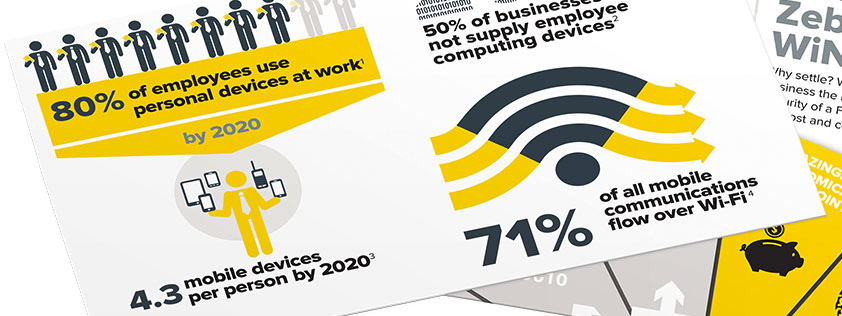Wireless LANs have become ubiquitous, both in homes and in the workplace. There is clearly a difference between the wireless infrastructure required for a large factory or warehouse and the type of off-the-shelf WLAN most people use in their homes, but smaller and medium-sized businesses are often torn between those two options. Can they get by with a lower-cost, consumer-style network, or do they need enterprise class Wi-Fi?
While there are some instances where a very small business might get by with consumer equipment, for most companies an enterprise wireless solution will be required to support the company's data traffic and operational requirements. Below, we've listed some of the key features of an enterprise-class Wi-Fi network, and how those features will benefit your business:
Enterprise class security: Wireless networks and mobile devices present a vulnerability that is increasingly appealing to hackers. While it is unlikely that there is much actual data in your warehouse management or supply chain system that would be valuable to thieves, the WLAN could provide a back door into the broader enterprise network where important corporate and customer data resides.
An enterprise class Wi-Fi solution will support dynamic encryption keys, password protection, client access control, and data encryption. An enterprise solution can provide intrusion protection and alerting as well.
Reliability: Enterprise class Wi-Fi equipment is also more durable, reliable, and stable than cheaper, off-the-shelf access points and routers. Enterprise wireless solutions also support seamless, secure roaming so that users don't experience drops or other connectivity issues as they move from one area of a building to another. Even as the client device is authenticated across multiple access points, the user should experience an uninterrupted connection.
Bandwidth: Business applications may require sending large volumes of data, support for a high number of mobile devices, or sending video or image files over the network. For example, rugged data collection devices like the Zebra Technologies MC 9000 line of terminals may access cloud- or browser-based applications over the WLAN, or be used to send images of a damaged package or product. With a larger number of such advanced client devices in operation, you'll need multiple, well-placed and professionally configured enterprise access points.
Guest Access: In a retail environment, a hospital, a restaurant, or in other businesses, the WLAN doesn't just support business applications. Most of these locations also provide guest access to the network over a separate VLAN. Enterprise-class Wi-Fi solutions provide a way to segregate corporate and guest traffic, and manage and monitor that access so that it does not interfere with corporate applications.
Management: Operating multiple access points in a facility typically requires a controller (or an access point that acts as a controller) that provides a central point from which to configure and manage the network. Enterprise-class Wi-Fi solutions also come with management software that provide additional security and reporting functionality, simplified, role-based dashboards for IT support staff, and other features that make it easier to manage these large deployments.
Enterprise Class Wi-Fi for Small and Mid-Sized Businesses
These enterprise features come at a cost, but solutions are emerging for small and medium-sized businesses. For example, Zebra Technologies' WiNG Express solution for smaller businesses allows companies to deploy up to 25 access points with no controller. The solution can also provide centralized management of multiple sites or installations with up to 1,024 access points.
For smaller businesses that want to ensure their wireless network can support and grow with their business, enterprise class Wi-Fi solutions are the best choice. The availability of easy to use and affordable enterprise wireless options makes that choice even easier.




